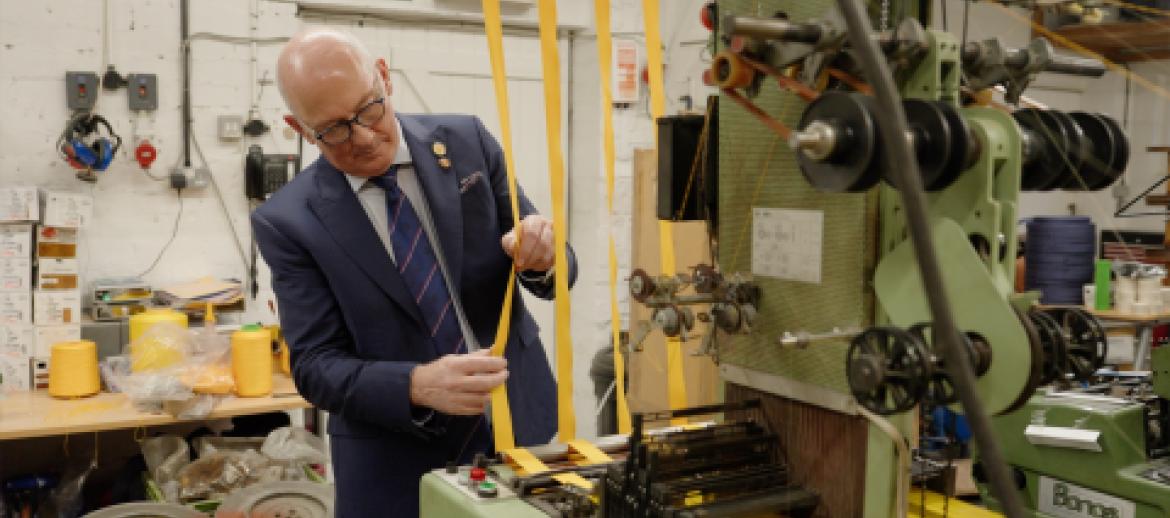Case Study: Weaving company’s fascinating history sewn into its success
Wyedean Weaving is a company with roots dating back to the Industrial Revolution. Initially formed in Coventry in the 1850s as Dalton, Barton & Co, its founders were pioneers in the narrow fabric industry, and around the turn of the 1900s the company had grown to become the world’s largest haberdasher, with a department store in London.
But after 100 years in business, Dalton, Barton & Co found itself at a crossroads. It had rebuilt and adapted after the Blitz devastated both its factory and department store, but by the late 1950s, a decline in haberdashery, coupled with labour competition from the motor industry, meant the company needed a new direction.
David Wright joined in 1959 and was tasked with reshaping the business. It moved to Coleford in Gloucestershire which was where its new name was coined – after the river Wye and the Forest of Dean. In the 1960s legislation was being brought in for every car to have a seatbelt fitted in the driver's seat and so the company shifted its focus. Unfortunately, so too did every other narrow fabric manufacturing company in Europe, which led to a price war and the company was a risk.
David saw that Wyedean’s sideline of military uniform accoutrement could be profitable, albeit very small, but enough to sustain a family company with a long-term future. He struck a deal with the owners, and in 1964 brought Wyedean back to his birthplace in Haworth, West Yorkshire, renting a small premises at Bridgehouse Mill, where it has specialised in the production of military braid and uniform accoutrement for the past 60 years.
Now, one of the largest employers in Howarth, Wyedean is once again a thriving business led by David’s son and Managing Director Robin Wright. In 2023 the business was awarded a seven-year contract to replace all British Armed Forces Standards and Colours with the King’s insignia and the Tudor Crown.
In his time, Robin, who joined the business 45 years ago, has overseen the diversification of the company’s product range, introduced e-commerce and moved part of the production offshore, establishing and managing a global supply chain.
He explains that while military accoutrement will always be at the heart of Wyedean’s business, the company has needed to look at other ways it can continue to diversify and grow.
“We've had to seek new markets and broaden the range of products we make,” said Robin. “Rather than being just focused on textiles, we've now gone into metal insignia and equine, supplying all the products for horses in ceremonial roles, such as the saddles and bridles.
“Combined with that, we've looked for new markets overseas. They tend to be places that follow British tradition; Commonwealth countries such as Australia, New Zealand, the Gulf States and Canada. We have to buck the trend and build additional business to compensate for the reduction in the number of badges.
“In addition to our core business of military uniform accoutrement, we are also looking at what other sectors we can get involved with. That’s taken us into the technical textile sector, and we’re now weaving glass fibre for high-temperature applications.
“We’re also making accessories for dogs – collars, leads and harnesses - but at a very high-end level. We're looking to the markets in California, New York and Tokyo, where we can really provide a bespoke item. But whilst diversification is a part of the process, military will always be at the core of our business.”
Witnessing some of this success, Armstrong Watson has worked with Wyedean over the past seven years and Robin says the firm’s support and advice has been beneficial in a number of ways.
“There are many different areas you require assistance and Armstrong Watson has the depth to bring specialists out in whichever area we might need, whether it be research and development, tax advice, or investment advice about where best and how best to invest our funds for the future,” he said.
“It's good to have the sounding board about how you plan and how you manage the future directions of the business.”

